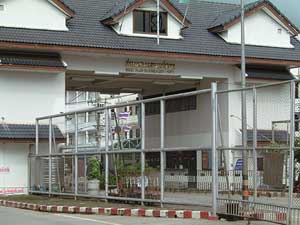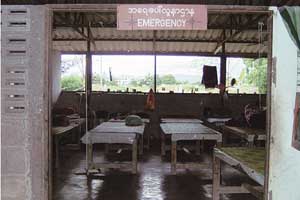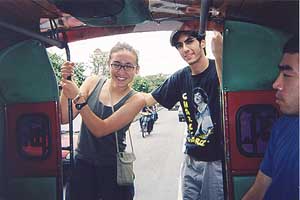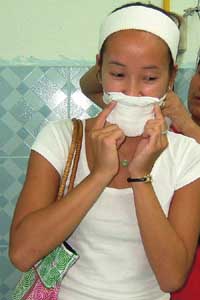Fourth-year planned Burma trip to study economic ills, social problems
By Josh SchonwaldNews Office
 The Friendship Bridge serves as the border crossing between Mae Sot, Thailand, and Myawaddy, Burma.  After planning many campus activities designed to get attention for the social and economic conditions in Burma, Cristina Moon, a fourth-year in the College, recruited a group of students and a few members of the faculty for a study trip to the Southeast Asian country. Moon’s attempt to create broader awareness of the problems that exist in Burma succeeded in her fact-finding mission to the country and its neighboring Thailand. She was able to share a substantive, educational journey with her classmates, who have committed themselves to activism and further study focused on Burma. Moon and her fellow travelers visited orphanages and clinics, including the Mae Tao Clinic.  Students who accompanied Cristina Moon on the trip to Thailand and Burma are (left to right) third-year Leila Vaez-Azizi, third-year Alex Goldenburg and Chu-Wei Chen (A.B.,’04).  Trang Nguyen, a second-year student in the Pritzker School of Medicine who participated in the study trip, prepares to observe a surgery. | |
Last summer, on their first day in Bangkok, a group of Chicago students and faculty members spent three hours speaking with Kyaw Thura, foreign relations secretary of the All Burma Student’s Democratic Front, which has been in an armed struggle with the Burmese government since the late 1980s.
In the ensuing two weeks, the Chicago delegation had 15 more meetings; they interviewed soldiers of Burma’s major armed resistance, the leadership of the Karen National Union; they met with several State Department officials in Bangkok to discuss U.S. policy in Burma; they met with investigative journalist Bertil Lintner and anthropologist Christina Fink, two influential writers on Burma; and they discussed human rights law and development strategies with leaders of some of the most important non-governmental organizations focused on Burma.
The two-week trip, which included stints in Bangkok, Chiang Mai and the Thai/Burmese border city of Mae Sot, had a profound affect on the 15 travelers, some of whom initially knew little about Burmese history or the extent to which Burma’s brutal military regime has decimated its social and economic infrastructure.
Upon his return, one student in the College began studying Thai; he is considering working for a Burmese NGO someday. A faculty member and a graduate student are drafting a paper based on the trip, and a group of students is planning an online resource on Burma for academics and activists.
Memorable for its transformative impact on the delegates, the trip’s unusual access to political and military leaders in Burma—arranged not by the State Department, the University’s administration or a senior faculty member, but by College fourth-year Cristina Moon—made this “study trip” an extraordinary experience. Moon coordinated all of the appointments, made the travel arrangements and acquired both faculty support and funding for the trip.
Moon, who had a longstanding interest in human rights in Asia and who founded a campus group to work on issues in Burma, wanted to introduce fellow students and faculty members to Burma, and did so through an academic fact-finding mission. The first of its kind in the College’s history, the study trip was conducted like a travel seminar with the sole intention of gaining knowledge.
“It’s really a monument to Cristina’s creativity,” said John Kelly, Professor in Anthropology and Master of the Social Sciences Collegiate Division, who served as faculty sponsor. “She did a remarkable job of organizing the trip.”
Dean of the College John Boyer, who has aggressively encouraged students to pursue international education through study abroad programs and Foreign Language Acquisition Grants, hopes other students in the College also will initiate such trips abroad. “This project represents the very type of intellectually curious endeavor that we encourage and support,” said Boyer.
A Southeast Asian country sandwiched between Thailand, China and India, Burma has been ravaged by bloody civil wars for much of the past half century, but the American media have given little attention to the country and its struggles. Moon first discovered the anonymity of Burma’s plight during a 2001 presentation at International House. The Scholars at Risk Network at the University sponsored a panel discussion featuring two former student leaders—one from Tibet, another from Burma. Following a presentation on the roles students play in social movements, nearly all of the questions asked were directed to the Tibetan student. It was not that the audience was uninterested in Burmese student Aung Din’s experiences as a leader of the 8-8-88 uprisings, said Moon, but “there was just such greater knowledge of the situation in Tibet.”
Following the conference, Moon, then a first-year student working as an intern with the Scholars at Risk Network, was invited by its director Robert Quinn to dine with the panelists. That invitation allowed her to meet both Aung Din and Dr. Zarni, the founder of the Free Burma Coalition.
With Zarni’s encouragement, Moon took an internship with the Free Burma Coalition during the summer of 2001. Her interest in Burma’s situation grew and was further fueled by Human Rights Program Activist Fellow Moe Thee Zun, a leader of the student movement in Burma. Moon recalls visiting a Burmese Buddhist temple with Moe Thee Zun. “As friendly as everyone was toward us, there was definitely always a lot of empty space around Moe Thee Zun,” she said. “It’s testament to the degree to which democracy activists become pariahs in affluent (and thus military-affiliated) Burmese communities.”
During the past two years at Chicago, Moon organized teach-ins and held 24-hour fasts to raise awareness about Burma. “But nothing I did seemed to get the attention of students,” she said.
Moon’s concept for the delegation was modeled on one that Alison Boden, Dean of Rockefeller Chapel and Senior Lecturer in the Divinity School and the College, had previously led to South Africa. Having already helped to lead a group of documentary filmmakers through Thailand in 2002 with the Free Burma Coalition, Moon was convinced she could spearhead a University Burma trip. Her original idea was unabashedly activist-inspired. By bringing students to Burma, she envisioned them returning deeply moved and dedicated to studying Burma and helping its democracy movement.
Because of the estimated $1,400-per-person price tag on the trip, Moon approached the College for financial assistance. “In order for the College to support the trip, it had to be more than just activism,” said Kelly. “It had to promote the mission of the University—to study, to increase knowledge.”
One of the first people to embrace Moon’s idea was Kevin Caffrey, Preceptor in the Master of Arts Program in Social Sciences, who had traveled widely through Southeast Asia as a Taiwan-based consultant. Caffrey had studied the Muslim populations in Western China and had nurtured an interest in Burma, which has a Muslim minority. Caffrey, whose work had taken him to some of the region’s trouble spots, such as East Timor, Tibet and Cambodia, agreed with Moon that Burma was woefully understudied and primed for a broader scholarly examination. In seeking the necessary faculty support for the trip, Caffrey found Kelly, whose academic focus had been on Fiji and India, but who also had a longtime interest in Burma.
Kelly was thrilled by Moon and Caffrey’s proposal, and Moon, having taken Kelly’s “Military Theory and Practice” class, also saw a fortunate match. “As an anthropologist who had a great knowledge of the effects of colonialism, anti-colonial movements, and armed struggle on India and Fiji,” she said, “he seemed like he would add so much to the trip for the students and also would be in a great position to gain from the trip himself.” Indeed, Kelly saw the trip in its simplest form: to answer the fundamental questions of the crisis in Burma—How did Burma get into this situation? And what can be done?
Aided by the validation of Kelly, and later Frank Reynolds, Professor Emeritus in the Divinity School, Moon was able to acquire “official study trip” status from the College.
Bill Michel, Assistant Vice President for Student Life and Associate Dean of the College, had some initial concerns about student safety and travel logistics in Thailand but was impressed with Moon’s thoroughness in preparing an itinerary. She had a safety plan, had detailed in-country support, provided emergency numbers and consular contacts for each leg of the trip, and had secured faculty support.
“She did a great job of putting this together,” Michel said. “We were excited about the possibility of helping her. This was a true student idea that was linked with a faculty member. We’d like to see more of this.”
With her previous experiences gained through the Free Burma Coalition, Moon was in a unique position to line up meetings for the 15 members of the study group. She wanted to make sure the trip was not a “superficial tour.”
Not only did the group meet some of the political and military leaders invested in Burma, but they also toured hospitals and orphanages and a slum for undocumented Burmese migrant laborers in the border city of Mae Sot.
The trip produced the transformative effect Moon had envisioned. “I was blown away,” said Moon. “The people who went on the trip really seemed to have returned with a commitment to Burma, a desire for more knowledge about Burma and a desire for integrating Burma into University life.”
This active interest is taking many different forms, Moon said, from scholarly work to artistic expression. Student Alta Buden submitted a proposal for a Festival of the Arts grant to work on Burmese “spirit houses.” The spirit houses, which may be positioned on the Quadrangles this spring, will represent some of the ills of Burma—sex trafficking and poor conditions for laborers.
Moon’s own work in raising awareness about Burma continues. She and Kiran Banerjee, a third-year who participated in the trip, are now compiling resources into an online Burma resource that will, when completed, include literature and video from the trip, and Web logs from trip participants. She and trip participants also are preparing to give a presentation about the trip and what they learned to the University community early in Spring Quarter. Moon and third-year Alex Goldenburg are planning on leading a second study trip.
As Moon also looks to her future as a graduate of the College, she said, “I’m looking for someone to take over. I want this to continue.” As for her own post-graduation plans, she hopes to complete by fall a documentary film about a K-3 school she and her friend are building in Burma for internally displaced children and war orphans. After that, she hopes to return to Asia to work for an NGO and continue working for progress in human rights there.
Though fully acknowledging the bleakness of the situation in Burma—it is a country that has, for instance, more child soldiers than any other country—Moon is undeterred by comments that “democracy” in Burma is a hopeless cause. “Despite the darkness, you can see the light in people’s eyes. These people are resourceful.”
![[Chronicle]](/images/sidebar_header_oct06.gif)